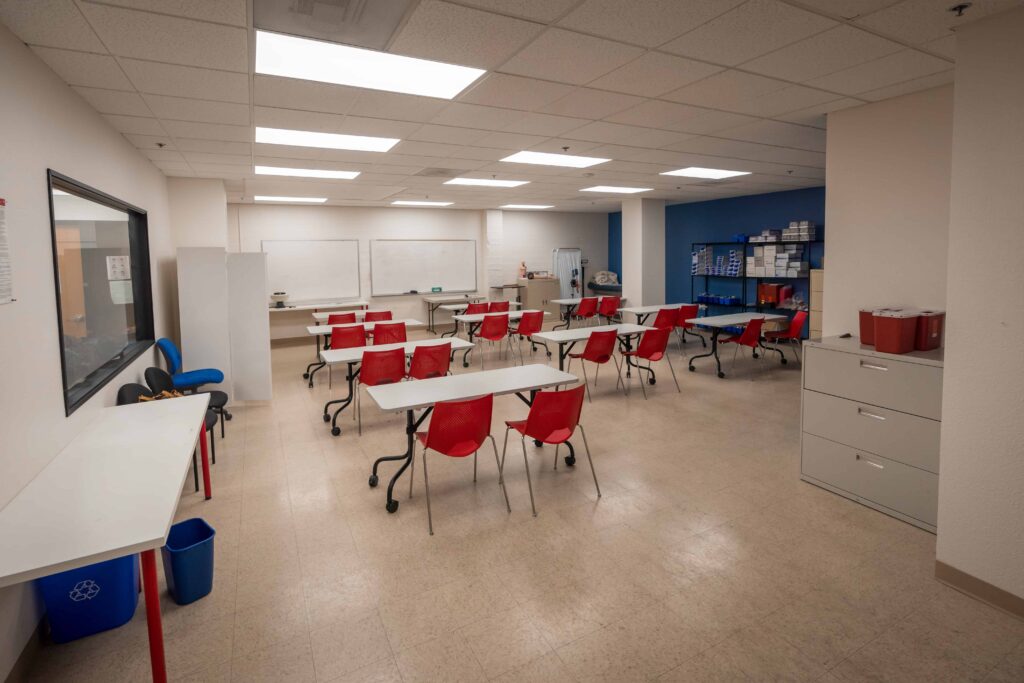Class Calendar | Call admissions on 415-943-2028
Find Medical Assistant with Phlebotomy training at Bay Area Medical Academy
Class Calendar | Call admissions on 415-943-2028

If you want to become a phlebotomist, one of the first questions you might ask is: “Do you need a degree to be a phlebotomist in California?” The simple answer is “No, but…” While you don’t need a degree to practice phlebotomy, you do need to meet specific educational and training requirements, pass a national test, and get your CPT-I license. While that might seem overwhelming, the process can be straightforward with the right help and support.
While you don’t need a degree to become a phlebotomist in California, you do need to complete an accredited phlebotomy training program. The course requirements will be different based on any on-the-job training or experience you have before starting the program, but if you begin a program fresh with no experience, you will need a program that includes:
These educational requirements will serve as the foundation of your training, which will be strengthened and reinforced during your clinical externship. Not all programs will help you secure an externship placement, so choose a program with the resources and connections to help you find a good fit.
Phlebotomists are the individuals responsible for collecting blood from patients in hospital or clinic settings and delivering those samples for the appropriate testing. Phlebotomists can work in many additional settings, but the technical skills they need are the same.
Phlebotomy students often begin training using models before moving on to group or partner practice with their classmates. Completing multiple blood draws will help the student feel more comfortable working with their patient’s unique anatomical variations when they are in the field. CPT-I phlebotomists will need to be proficient in multiple kinds of blood draws.
There is also an arterial puncture; however, this procedure is more complicated and not permitted under the CPT-I license. An arterial puncture is only required for more advanced phlebotomist positions for those with extensive experience and a CPT-II license.
After you have completed your formal education, you will need to pass a national phlebotomy exam to apply for your CPT-I license. While there are many exams offered and accepted by the California Department of Health, the most common is the National Center for Competency Testing (NCCT) Phlebotomy Exam (NCPT).
The NCPT is one of the most well-known and established exams, so it has name recognition with both the licensing board and potential employers. Choosing an excellent program for your phlebotomy training will make it easier to feel prepared and pass your national exam.
Once you have completed your training program, completed your externship hours, and passed your national examination, you can apply for your CPT-I license. Note that you do not have to have a degree from your training program to be eligible for a license application; you just need to have successfully completed your program and all the requirements. A good phlebotomy training program will provide additional support for students navigating the CPT-I application process.
If you are ready to begin your career in phlebotomy and see where the profession can take you, BAMA Institute is prepared to help. Do you need a degree to be a phlebotomist in California? No. But you do need an excellent education.
BAMA Institute is the premier healthcare training program for phlebotomists in the Bay Area. With campuses in San Francisco and San Jose and frequent start dates, there will be a time and place for you to start your phlebotomy journey.
BAMA Institute is well-known, fully accredited, and has a history of producing impeccably skilled and highly employable phlebotomists. The staff and instructors at BAMA Institute are here for you. They are ready to provide you with a superb education and all the support you need with externship placement and your license application.
If you’re ready to sign up, contact us or enroll online
"*" indicates required fields
© 2024 BAMA Institute. All Rights Reserved. Website by WindsAndWater